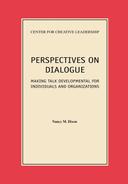Appendix B: The Conditions of Dialogue
In this appendix I have placed the major constructs of the theorists discussed above into two categories: speech acts, by which I mean what individuals who are engaging in dialogue actually do; and situation variables, which are the norms and conditions under which the speech acts are exercised. In developing this consolidated list, I have stated each construct in the language of one specific theorist and then attached to it the names of theorists who are in agreement with that construct; in some cases this may do disservice to the theorist whose language is not represented. Moreover, the first list is more heavily weighted with the ideas of Argyris and of Johnson and Johnson, who focused more on technique than Freire, Bohm, and Mezirow.
(1) Provide others accurate and complete information including feelings that bear upon the issue (Argyris, Johnson and Johnson, Mezirow);
(2) advocate one’s own position (Argyris, Johnson and Johnson);
(3) make the reasoning in one’s own views explicit—say how one got from the data to one’s conclusion (Argyris);
(4) invite others to critique or inquire into one’s own reasoning (Argyris, Bohm);
(5) identify reasoning errors in others (Argyris, Johnson and Johnson);
(6) when someone’s view differs from one’s own, inquire into other’s reasoning (Argyris, Bohm);
(7) confirm others’ personal competence when disagreeing with their ideas (Johnson and Johnson);
(8) design ways to test competing views (Argyris);
(9) regard assertions (one’s own and others) as hypotheses-to-be-tested (Argyris, Bohm);
(10) voice the perspective of others (Johnson and Johnson, Mezirow, Argyris);
(11) change position when others offer convincing data and rationale (Argyris, Johnson and Johnson);
(12) illustrate and publicly test inferences (Argyris);
(13) back up generalizations with concrete examples (Johnson and Johnson, Argyris);
(14) advocate the exertion of effort to achieve mutual goals (Johnson and Johnson);
(15) acknowledge similarities in ideas as well as differences (Johnson and Johnson);
(16) reflect critically upon presuppositions and their consequences (Mezirow, Argyris, Bohm, Freire);
(17) weigh evidence and assess arguments objectively (Mezirow).
In dialogue,
(1) members feel free from coercion (Mezirow, Johnson and Johnson, Argyris, Bohm, Freire);
(2) participants have equal opportunity to participate—including the chance to challenge, question, refute, and reflect and to hear others do the same (Argyris, Johnson and Johnson, Bohm, Mezirow);
(3) participants are heterogeneous in terms of such factors as personality, sex, attitudes, diverse experiences, and ability levels (Johnson and Johnson);
(4) the context is cooperative, individuals feel it is safe to challenge each other, and controversy is viewed as constructive (Johnson and Johnson, Argyris);
(5) information and expertise are distributed among participants, and participants do not feel the need to defer to one individual (Johnson and Johnson, Freire);
(6) meetings are held without purpose or agenda (Bohm);
(7) groups have positive outcome interdependence (Johnson and Johnson);
(8) groups have means interdependence (Johnson and Johnson).
